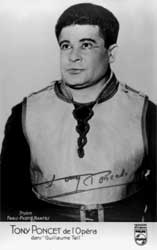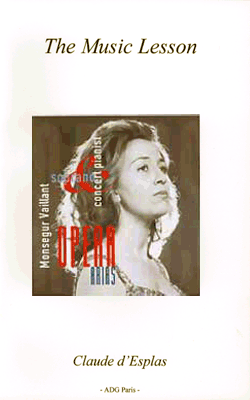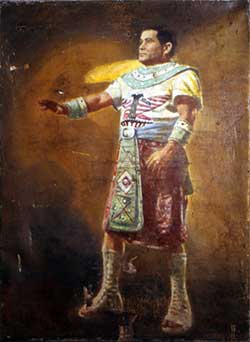|
|
 Arcachon 1965. Tony Poncet confides to a journalist-friend: ‘... none of the Italian tenors classed among the greatest, Mario del Monaco, Giuseppe Di Stefano, Franco Corelli, sings in the tone (always half a tone or a tone below score) ... That is, why I would like to have assembled the ten best Italian tenors and I taking them one by one. Then it would be obvious who sings, as against those who vocalize’. At Vauvert, at Toulouse, in Belgium, at Lyon, Bordeaux, at Saint-Etienne, at Toulon or at Cannes you will be told that Tony Poncet is the most extraordinary tenor in the world. You will not be explained that — because of him — the higher passage note, as the ‘technicians of music’ say, has reached such heights, out of concern for the original tone, that Caruso in person would have lost his registers. From the lands of the vine to the earth of hop you will not be quoted all those (they are so numerous) who, like this Major of the Belgian army and his 43 Aïda, inhaled with him and through him, the ether of the Bel Canto. From Bagnères cathedral, starting point for the conquest of Europe by the vocal waves of Alfred Roland’s Quarante Chanteurs Montagnards, to humble countryside churches, the name of the First Soloist of the Bédat (who did not recognize him immediately by the Minuit Chrétiens or by the Ave Maria among the pure utterances of those who had their debut at his side?) will not be given... His Voyage au Bout de la Nuit, Tony Poncet started it, too, at Place Clichy, two steps away from the Wacker Studios, in a big café (frequented by the Munich People at a time when he himself, rather like Dufilho, was experimenting, in Bavaria, a European community ahead of written documents). There he exposed in detail Le Rêve Passe: he arrived from the gare d’Austerlitz; he sang the Marseillaise with this accent that was coming straight down from the pastures of the Bigorre and with which, between pear and cheese plateau, failing other plateaux, he was reproached by the society divas. This accent, however, was not disavowed by the little shepherdess of Bartrès, nor by her Interlocutress whom Tony, all his life, unique fervour, greeted in Latin (he was polyglot!). ‘He was a shepherd’, a patronizing tenor with a voice lacking high tones threw in one day. He was indeed the shepherd of shepherds, he was ‘Arnold’, shepherd and ‘dalhayre’ (mower), in the words of the connaisseurs on the grassy slopes of the Pyrenean mountains where the giants of the Tour de France are labouring; those who, like him, start up from the first sharp bends of Ste-Marie-de-Campan. Naturally, he moved his grass-cutter across the lawns of Listrac or of St-Aigulin, but he spent hours putting to sharp use his scythe with green handle and red ornaments, alone, perhaps, still able to do it in these villages on the border of Gascony, that his heart had told him to choose. Obviously, he polished his ‘telescopic’ gun, but Gaspard (from the Animal Rescue Home, Tarbes), his Pyrenean miniature, never raised a rabbit (if only as fricassee) for his master, a marksman who never travelled (who does not know?) without his little black case, the colt and the bullets, souvenir of by-gone calls to arms and counter-calls (in the absence of encores) at Stalag VII A and of his refusal to sing for the Esthetes who had silenced the tenor Joseph Schmidt. For sure, he was leading a ‘break heart, break neck’ life: mechanic, chauffeur, tank driver, ‘bulldozer of the French opera’, a site manager, if you like!, he went fast. Dachau within range Patton’s tanks did not have to ask for the key: tank-man Poncet knew the music. He beat time for them. The Americans remember who awarded him the Medal of Liberty ‘because we have not forgotten’. His last car was an American-German beauty: he had made peace!
The women? How could he not have loved them? Madame Butterfly, he met her in Tokyo, Micaëla in Bucarest. He cited Beverly Sills ‘Ah, what a Queen of Navarra!’ with whom he sang Les Huguenots in New York rather than Maria Callas who preferred Di Stefano to this ‘handsome devil!’ Tony Poncet. He had a vocal respect for his female partners, that his high notes — had he chosen this — could have embarrassed considerably. Noblesse oblige! This Don José, this ‘Piaf’ of the opera, in the words of Germaine Lubin who admired the small woman in black of La Vie en Rose as much as the ‘Italian’ singer of theRosenkavalier (The Knight of the Rose) enjoyed himself, as for him, in the company of the great toreadors, his friends: El Cordobes, Cerdan, Albaladejo. From the arenas of Lutèce to those of Nîmes, he gave the final stab, however, to more Escamillos than to wild beasts. He loved the Basque Country, the sky of Pau, the rugby-champagne of the lads of Bagnères, the contours of the Arcachon Basin (‘nothing all the way to the Americas’), whence he had returned more of a Globe-Trotter than the children of Harlem, having ‘roused’ the masses and refused to serve as a voice-lender to a Mario Lanza in the film the latter had made opposite Tebaldi. He loved the pine-trees of the Landes, the rosé of the Béarn, Pyrenean mountain torrents and their trout, the westerns where the wicked are always punished (‘you do have to shoot first!’), war films in their original version (‘to keep up my English’) and games of boules under the foliage of Capvern with Fernandel and Brassens whose ‘Toute la vérité, Messieurs, je vous la livre...’ (The entire truth, Gentlemen, I hand it to you...) he appreciated. Faithful to his friends, the craftsmen of his childhood a little wild from which he retained a taste for passing frontiers without a passport (‘exported by the adversary, I tried to reimport myself, alone, without impresario’), the comrades in captivity, the stagehands at the Opera, Luis Mariano who obtained for him his first engagements, Fernand Raynaud whom, at the time ofOpera Non Stop, Tony Poncet was looking for in vain on the stage of Clermont-Ferrand Opera, and who, also close to the people, could not stand pill-sweeteners, overpraised reputations, false naivety — try as one might to pass off a counter-C as a D natural... or (in spite of quite a memorable Tournament in Cannes) a king Faruk as a Radames (‘I say, why do you cough?’). The critic who accused him of acting, on stage, ‘as demonstratively and movingly as a piece of wood’, has for an answer the simple reflection of this usherette of a provincial Grand Theatre: ‘I have never seen him enter the scene in Paillasse, without shedding a tear’, or the remark of Dominique Plessis rectifying comments by a ‘great’ singer: ‘Tony Poncet measures 10cm less, but when he sings, he reaches two metres’. A modest man, our tenor recognized nonetheless: ‘Caruso is 2cm taller than me, but he has two high notes less’. The Troubadour Poncet was one of these logs that serve for making flames. This voice of the century with its unwavering legato (have you heard him murmur España mia or Te Quiéro?), a Malibran would have been equal to it; it would have required a Carmen to bend this Don José, but the gipsies (cigarettes), he loved them only ‘maïs’ (maize), to avoid the smoke. He, whose career gravitated around Austerlitz and Wagram, no sooner did he push open the door to any brasserie in rue Legendre — frequented, it must be said, by quite big names — than ten people pressed him to grant them a signature as a memento of the time when the conductors ‘stirred their mayonnaise’ while awaiting the end of the applause that greeted the phrase ‘ô, Mathilde, idole de mon âme’ in a true delirium. ‘This is because there was a fullness of diction and of voice which subjugated the listener, and because the admirable melodies of the great Italian master were radiant with a new light while passing through the chest notes of this wonderful voice and through a declamation of unknown power’: these are the very words of Charles Gounod who had heard Duprez and thus greeted ‘au passage’ the hero of William Tell. Unvanquished, Tony Poncet has gone away alone, in the clothes of Arnold, towards this marvellous country, this fortunate garden, as in L’Africaine, his sheepskin jacket still hung up, on the right, in the vestibule of the Green House, his small beret ‘forgotten’ in rue de Rome at the house of the ‘Leading Soprano of France’ — in the supreme hope, no doubt — to sing better perhaps: ‘and these joyful soldiers, Frenchmen, are our soldiers! ...’ (Le Rêve Passe).
Claude d’Esplas (The Music Lesson) |
ADG-Paris © 2005-2024 - Sitemap






